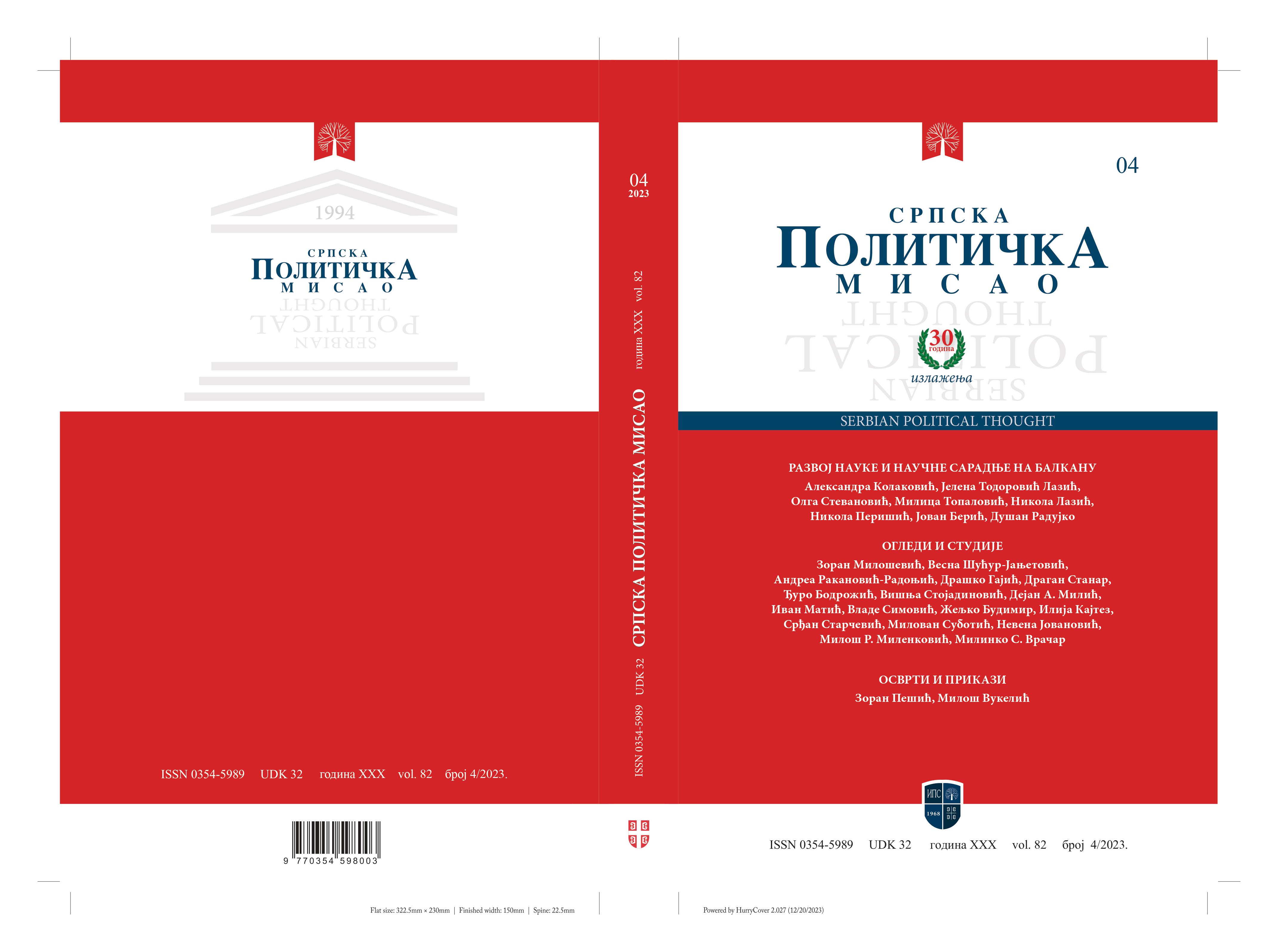PERCEIVING THE EUROPEAN UNION: INFLUENCE OF THE ERASMUS PROGRAM ON STUDENT OPINIONS
Abstract
This paper has the goal of presenting experiences of Faculty of Political Sciences, University of Belgrade students during their Erasmus program stays and to provide insights into the ways in which it influenced their opinions of the European union and the European integration process. After presenting the goals of the Erasmus program and the strategic documents of the Republic of Serbia within the field off education, the paper places the process of forming political opinions in theoretical context. The experiences of students which participated in the program within the 2017-2019. period are analyzed from the perspective of Erasmus program goals and the influence they have on the opinions and social networking of the participants. The paper concludes that all of the participants entered the program with already formed positive opinions on the European integration process, while also noting a development of skills and values related to the concept of European identity, such as openness and tolerance. Furthermore, the research finds that among the program participants there was no sense of otherness developed during their stay and that they were not faced with any serious administrative challenges which could negatively influence their perception of the European union. However, in order to encourage further development of the program, one must keep in mind that there exist certain barriers in the area of communicating information about requirements and procedures during application, as well as during the process of selecting and approving classes.
References
Aksay Aksezer, Esin, Yagmur, Kutlay and van de Vijver, Fons. 2021. ‘A qualitative study of Erasmus program challenges and paradoxes based on the experiences of students from Turkey’. Yüksekögretim Dergisi 11 (1): 63-73. doi:10.2399/yod.20.730970
Algan, Yann, et al. 2020. ‘Friendship Networks and Political Opinions: A Natural Experiment among Future French Politicians’. IZA Discussion Paper 14005: 1-58.
Altbach, Philip G., and Jane Knight. 2007. ‘The Internationalization of Higher Education: Motivations and Realities’. Journal of Studies in International Education 11 (3–4): 290–305. https://doi.org/10.1177/1028315307303542.
Bazić, Jovan, Eva Bujvid Kurek, i Žarko Obradović. 2019. ‘Srbija i izazovi evropskih integracija’. Srpska politička misao 64 (2): 49–72. https://doi.org/10.22182/spm.6422019.2.
Council Resolution on a Strategic Framework for European Cooperation in Education and Training towards the European Education Area and beyond (2021-2030). 2021. 2021/C 66/01. https://eur-lex.europa.eu/legal-content/EN/TXT/?uri=CELEX:32021G0226(01).
CRTA. 2022. ‘Politički Stavovi Građana Srbije Jesen 2022: Istraživanje Javnog Mnjenja’. Beograd: CRTA.
de Vreese, Claes H, Boomgaarden, Hajo G, and Semetko, Holli A. 2011. ‘(In)direct Framing Effects: The Effects of News Media Framing on Public Support for Turkish Membership in the European Union’. Communication Research, 38 (2): 179–205. https://doi.org/10.1177/0093650210384934
Dervin, Fred. 2009. ‘The Others as impediments to ‘integration’ into Finnish society: the case of exchange students in higher education’. Research on Finnish Society 2: 19–27.
Entman, Robert M. 1993. ‘Framing: Toward Clarification of a Fractured Paradigm’. Journal of Communication 43(4): 51–58. https://doi.org/10.1111/j.1460-2466.1993.tb01304.x
Eurobarometer. 2023. Standard Eurobarometer 98, Winter 2022-223: Public Opinion in the European Union. Brussels: European Commission.
European Commission. 2022a. Erasmus+ Annual Report 2021. LU: Publications Office. https://data.europa.eu/doi/10.2766/732923.
———. 2022b. ‘Erasmus+ Programme Guide 2023’. European Commision. https://erasmus-plus.ec.europa.eu/document/erasmus-programme-guide-2023-version-1.
‘Ex Post Analiza Sprovođenja Strategije Razvoja Obrazovanja u Republici Srbiji (SROS) Do 2020. Godine: Analiza Osvarenosti SROS 2020’. 2020. Vlada Republike Srbije. https://prosveta.gov.rs/wp-content/uploads/2021/02/3-Ex-post-analiza_0202.pdf.
Institut za evropske poslove. 2022. ‘Stavovi Građana Srbije Prema EU: Istraživanje Javnog Mnjenja’. Beograd: Institut za evropske poslove.
Jacobone, Vittoria, and Giuseppe Moro. 2014. ‘Evaluating the Impact of the Erasmus Programme: Skills and European Identity’. Assessment & Evaluation in Higher Education 40 (2): 309–28. https://doi.org/10.1080/02602938.2014.909005.
Kancelarija za evropske integracije. 2014. ‘Evropska Orijentacija Građana Srbije: Ispitivanje Javnog Mnjenja (Decembar 2014. Godine)’. Beograd: Kancelarija za evropske integracije, Vlada Republike Srbije. https://www.mpravde.gov.rs/sr/tekst/8108/istrazivanje-javnog-mnjenja-evropska-orijentacija-gradjana-srbije-trendovi.php.
Knight, Jane. 2021. ‘Higher Education Internationalization: Concepts, Rationales, and Frameworks’. Revista REDALINT. Universidad, Internacionalización e Integración Regional 1 (1): 65–88.
Kuhn, Theresa, Lancee, Bram Lancee and Sarrasin, Oriane. 2021. ‘Growing Up as a European? Parental Socialization and the Educational Divide in Euroskepticism’. Political Psychology, 42 (6): 957-975. doi: 10.1111/pops.12728
Li, Mei, and Mark Bray. 2007. ‘Cross-Border Flows of Students for Higher Education: Push–Pull Factors and Motivations of Mainland Chinese Students in Hong Kong and Macau’. Higher Education 53 (6): 791–818. https://doi.org/10.1007/s10734-005-5423-3.
Llurda, Enric, Lídia Gallego-Balsà, Clàudia Barahona, and Xavier Martin-Rubió. 2016. ‘Erasmus Student Mobility and the Construction of European Citizenship’. The Language Learning Journal 44 (3): 323–46. https://doi.org/10.1080/09571736.2016.1210911.
Markovic-Tomic, Milica. 2016. ‘Mediji i Teme u Vezi Sa Evropskom Integracijom Srbije u Periodu 2002-2016.’ CM: Komunikacija i Mediji, 37: 3–17. https://doi.org/10.5937/comman11-12326.
Ministarstvo za evropske integracije. n.d. ‘Poglavlje 26 - obrazovanje i kultura’. Pristupljeno 12 September 2023. https://www.mei.gov.rs//srp/obuka/e-obuke/vodic-kroz-pregovore-srbije-i-evropske-unije/klasteri/klaster-3/poglavlje-26-obrazovanje-i-kultura/.
Mutlu, Sevda, Alacahan, Osman and Erdil, Mahmut. 2010. ‘Comparison of the personal and cultural change taking place between EU Erasmus students and Turkish Erasmus students (within the sample of Adam Mickiewicz University in the city of Poznan, Poland)’. Eurasian Journal of Anthropology 1(1): 33−43.
‘O programu Erazmus+’. n.d. Erazmus+. Pristupljeno 5 September 2023. https://erasmusplus.rs/erazmus-program/o-programu/.
Oborune, Karina. 2013. ‘Becoming More European after ERASMUS? The Impact of the ERASMUS Programme on Political and Cultural Identity’. Epiphany 6 (1). https://doi.org/10.21533/epiphany.v6i1.60.
Pifer, Meghan J. and Baker, Vicki L. 2014. ‘It could be just because I'm different”: Otherness and its outcomes in doctoral education’. Journal of Diversity in Higher Education 7 (1): 14–30. https://doi.org/10.1037/a0035858
Santis, Esteban Leonardo. 2021. Administrative Theory & Praxis 44 (2): 133-142. https://doi.org/10.1080/10841806.2021.1918989
Sindic, Denis and Condor, Susan. 2014. ‘Social Identity Theory and Self-Categorisation Theory’. In: Nesbitt-Larking, Paul et al. (eds). ‘The Palgrave Handbook of Global Political Psychology’. Palgrave Studies in Political Psychology Series. Palgrave Macmillan, London. https://doi.org/10.1007/978-1-137-29118-9_3
Vlada Republike Srbije. 2021. Strategija Razvoja Obrazovanja i Vaspitanja u Republici Srbiji Do 2030. Godine. ‘Sl. Glasnik RS’, Br. 63/2021.
Warren, Ron and Wicks, Robert H. 2011. ‘Political Socialization: Modeling Teen Political and Civic Engagement’. Journalism & Mass Communication Quarterly, 88(1): 156–175. https://doi.org/10.1177/107769901108800109
WFD. 2023. ‘Izveštaj Sa Istraživanja Javnog Mnjenja: Društveno-Politički Stavovi Građana Srbije 2023. Godine’. Beograd: Vestminsterska fondacija za demokratiju (WFD).
Zakon o visokom obrazovanju. 2021. ‘Sl. Glasnik RS’, br. 88/2017, 73/2018, 27/2018 - Dr. Zakon, 67/2019, 6/2020 - Dr. Zakoni, 11/2021 - Autentično Tumačenje, 67/2021 i 67/2021 - Dr. Zakon.

